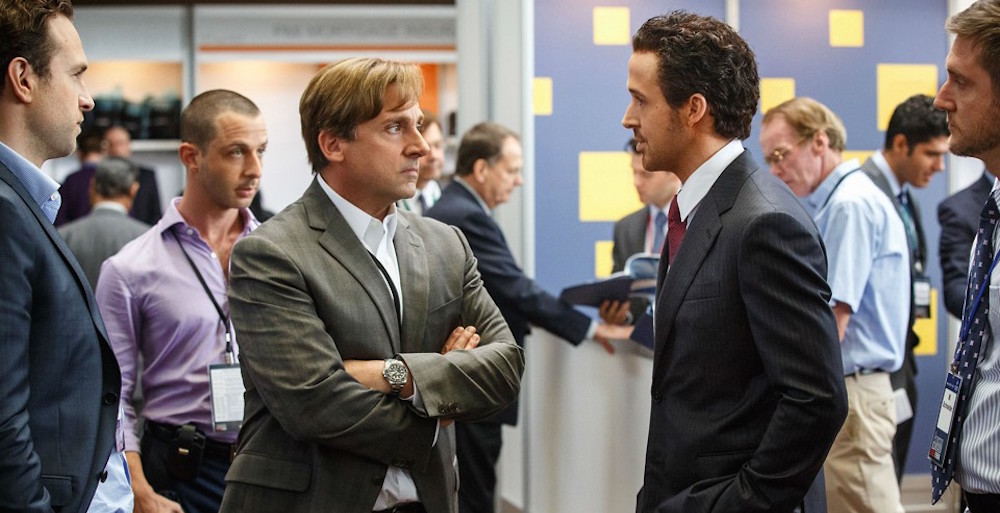Film theorist Linda Williams writes on the concept of body genres, which are types of film that evoke some sort of physical reaction or, more specifically, an emotion that invokes a physical sensation. The three she points to are pornography (arousal), horror (fear) and melodrama (crying).
I want to argue for a fourth to be added to that list, and it’s the “activist” genre. This is a film that seeks to draw specific attention to a story (often a true one) that relates to a particular issue and get you fired up, inducing a righteous fury about getting out there and solving it.
This year has seen a number of these sorts of films. Most recently, we have Spotlight, 99 Homes, Chi-raq and the film I’m here to talk about — The Big Short. And trust me, I’m not sure any other film on this list can embody the righteous fury of the activist film like The Big Short does.
The Big Short tells the story of the 2008 global financial crisis through three interweaving stories about the people who saw it coming. One storyline follows Michael Burry (Christian Bale), a former doctor and current hedge fund manager who figured out what was on the horizon and put his whole fund at risk trying to cash in on it, fighting against everyone who didn’t possess his foresight. Another storyline follows Mark Baum (Steve Carell), a cynical money manager with a short fuse attempting to fight the same system he’s deciding to exploit. Baum is no fan of the excess of Wall Street and its seemingly universal desire to screw over the people it’s supposed to help, but he can’t resist an opportunity to profit off the inevitable blowup. The third storyline is about Charlie Geller (John Magaro) and Jamie Shipley (Finn Wittrock), two young upstarts who stumble upon the information and attempt to use it to buy their way to the top with the help of Ben Rickert (Brad Pitt), an ex-Wall Street money manager and a current survivalist who lives next door to Geller and Shipley.
These stories are woven together with the help of Jared Vennett (Ryan Gosling), an eccentric Wall Street tycoon and a character that also serves as perhaps the most interesting narrative device I’ve seen in some time.
It seems Vennett’s just a fourth-wall breaking narrator, not unlike Martin Scorsese’s Wolf of Wall Street’s Jordan Belfort. But he’s a fourth-wall breaking narrator with a little more power than just addressing the audience. Weirdly enough, he seems to know the audience. At just the point of confusion, he explains what’s going on. He knows what’s in the audience’s head, and confirms it, or chastises them for thinking it. It’s a power that translates to the whole film and speaks to perhaps the most absolutely impressive element of this film: Adam McKay.
McKay as a director had largely been a part of the school of “filmed improv” comedy, with simplistic camera moves and a form that allowed actor performance to dominate the construction of the film. Films like Anchorman, Talladega Nights and even The Other Guys, which showed a bit of stylistic flair, did not point at the director that McKay shows he can be for The Big Short.
But The Big Short is a film that shows exactly what a director can do at their best, the absolute control and manipulation they can assert over the audience and the aspects of themselves they reveal within the vision they create. McKay’s raging and righteous fury towards not only the people who perpetuated this crisis, but the institutions that allowed it to happen and even excused it, seeps and comes through every aspect of this film. It’s an angry film, and you feel it just as much as McKay does.
Stylistically, it’s a huge step forward for him. Taking as many cues from documentaries, hip-hop videos and Funny or Die videos as he does in the traditional narrative comedies he’s made up until now, the film is sloppy and tightly constructed in equal measures and in ways that absolutely don’t contradict each other. McKay’s camera jaggedly jumps and glides across the unfolding events, never giving you an opportunity to look away or lose sight of what you’re seeing. He knows the exact moments to break his own narrative, partially because he’s guided you to the point and partially because he knows you as an audience member so well, and therefore, knows when to let his narrative play out. He lets every punch line, every reaction sit just a second too long to wash over and let the bad taste of what’s going on sit in your mouth. This is, of course, also thanks to cinematographer Barry Ackroyd and editor Hank Corwin, but McKay’s voice,power and fury sit through every beat and word of the film.
There are a lot of beats, and even more words. This is an extremely technical film, getting very deep into some very complex economic ideas that will lose some of its audience, even with the use of celebrity cutaways to help explain the specific financial mechanics that led to the crash. It’s kudos to the filmmaking that the film never slows down with the explanations, and it’s also kudos to the acting.
This is an ensemble film at its core, and while it may have a little more problem evenly splitting the credit than something like this year’s Spotlight, it still features a number of remarkable performances. Gosling as our narrator reminds us that he is capable of being an active actor, turning in a fine Wall Street-inspired comedic performance that is perhaps the absolute sleaziest he’s ever been. Bale’s Burry is a sympathetic and fun collection of tics and quirks that leans right towards the edge of being caricaturistic without ever fully pushing into it. Magaro and Wittrock give good, if not great, performances alongside Pitt’s also “good-not-great” performance, as I’ve got to confess that they’re the weakest part of the film itself.
I want to, however, specifically shout out to Steve Carell who absolutely turns in his best dramatic performance so far. It’s exactly what the film leans into and needs: a character who is absolutely as furious and cynical as the film itself. And Carell has as much confidence in his performance as the film has in itself. The desperate sweat that Carell had from his need to impress in Foxcatcher is gone, and he turns in a straight up phenomenal performance.
This is a film that’s difficult to write about. The Big Short is a sprawling and technically complex film that absolutely demands to be absorbed multiple times, and I’ve only been able to see it once. It’s all boiling rage and demands for a call to action that hits you in the gut again and again. It has a next-level sense of craft that makes it difficult to even begin to understand in your first go around. It’s an absolute surprise by coming out of nowhere to be one of the best films this year.
Get out and see this one over the holidays. And understand what’s happened to us before, and understand that it can (but should never) happen again.
GRADE: A
Opinion Editor | Brandon Wagner is a College Senior from God Only Knows Where, America studying Film and Media Studies with a minor in Religion. This is his first year for the Wheel, in a likely misguided experiment to be a film critic. When he's not writing on the biggest blockbusters or the films of Spike Jonze or Andrei Tarkovsky or Zack Snyder, he's writing on comedic television, the future of gaming as an art, or the relationship between audience and cinematic experience. In other words, Brandon Wagner has basically nothing else going on but this.







McKay pulls it off. I reviewed the film here: http://bit.ly/1RWheKa I left feeling similarly after watching “Wolf of Wall Street.”